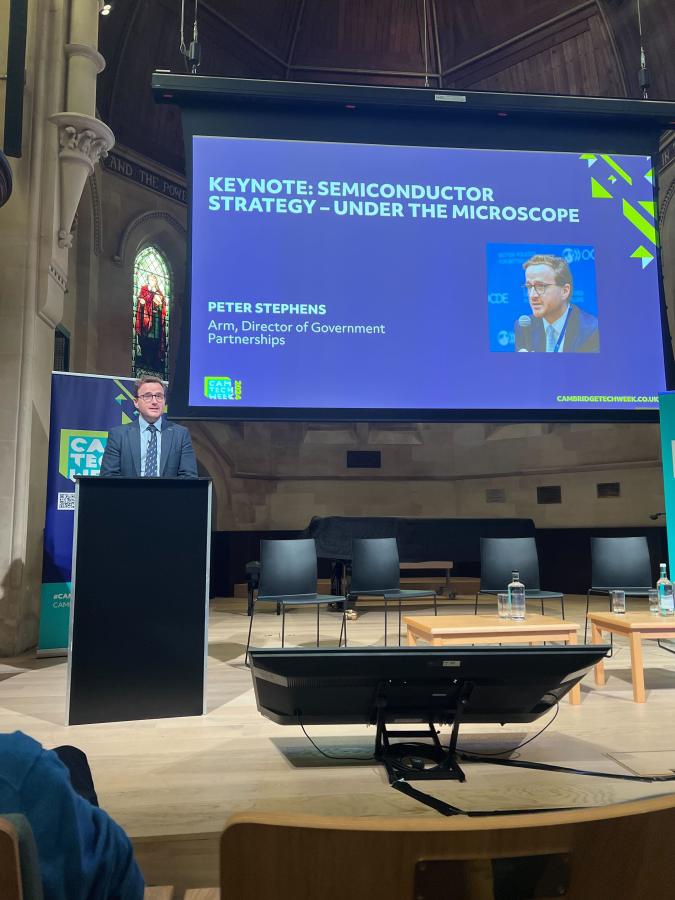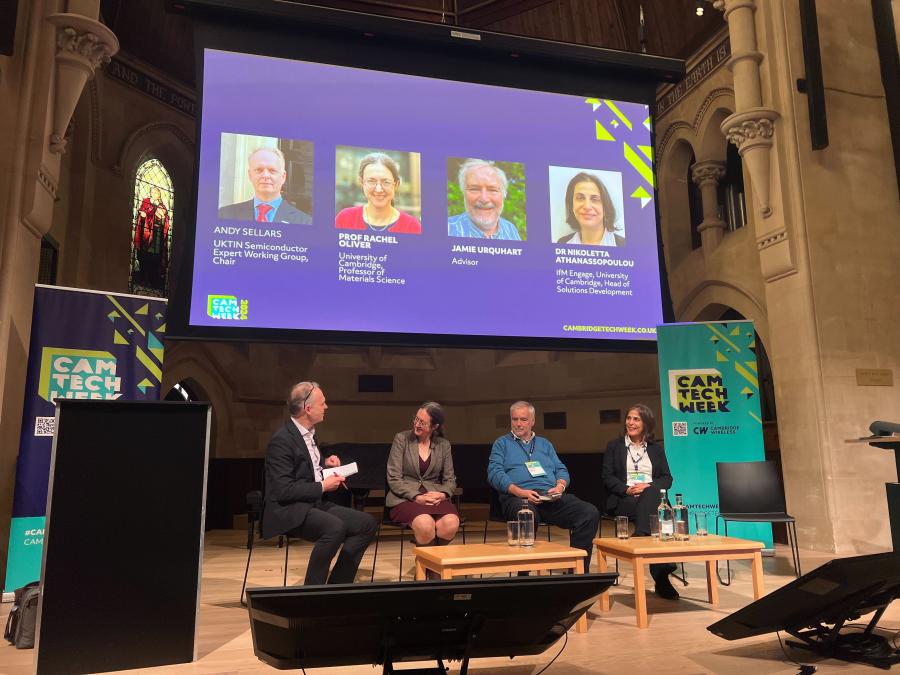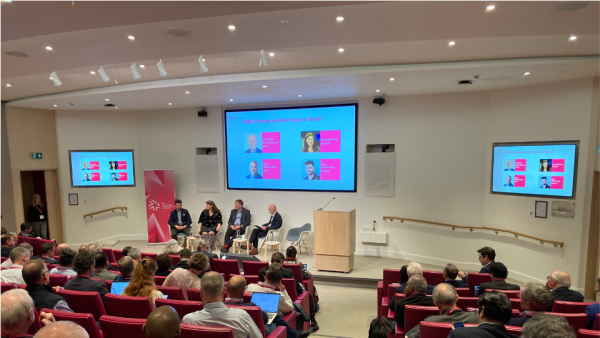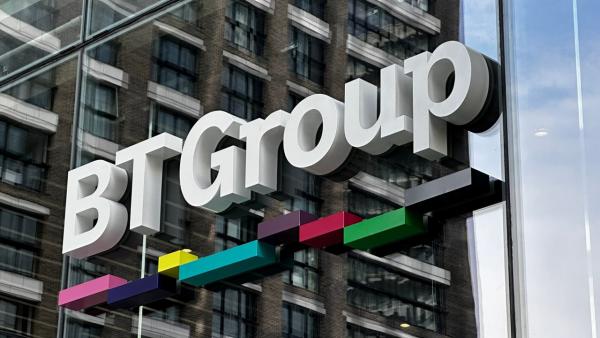
In Pembroke College on the 12th of September, Cambridge Tech Week hosted a semiconductors deep dive. Here are some of our highlights from the event:
Reasons to be proud
Across the various sessions there was a sense of recognition and pride in the significant achievements and strengths the UK has in semiconductors. Peter Stephens, Director of Government Partnerships at ARM started the event by recognising the leadership the UK had demonstrated over the past 30 years, highlighting that through ARM’s chips, 99% of smartphones today bear Cambridge’s fingerprint.
Cambridge was recognised as a particular cluster of deep tech capability – with the World Intellectual Property Organization’s Global Innovation Index 2023 recognising Cambridge as having the joint highest intensity science and technology cluster in the world, alongside San Jose.
Our strength in semiconductors is well established and expands beyond Cambridge: Charles Sturman, TechWorks CEO pointed to the 20 commercial fabs, seven academia or research institution fabs and over 160 companies in the UK engaged in design. With success stories including ARM, Cambridge Silicon Radio, Imagination and IQE the UK’s long heritage was highlighted, including companies who may no longer exist but have helped us reach our position today.

Opportunities for growth and further success
These strengths provide a springboard for growth and further success and across the presentations and panels there was an emphasis on the opportunities and elements needed to take the UK sector forward. Peter Stephens identified four things needed for success: skills, the development of a thriving domestic design ecosystem, establishing and embedding global partnerships and finding ways to highlight the UK’s strengths. As Stephens put it, “we don’t always play well for photo opportunities”, but a lack of visuals shouldn’t prevent us from celebrating our achievements.
This topic was explored in depth in a panel hosted by Andy Sellars, UKTIN Co-Chair of the Semiconductor Expert Working Group, with panellists including Professor Rachel Oliver from University of Cambridge, Jamie Urquhart, advisor and co-founer of ARM and Dr Nikoletta Athanassopoulou from the Institite of Manufacturing Engage, University of Cambridge.
In this panel and across the day it was highlighted that the UK is an academic powerhouse for generating ideas, that we have a wealth of knowledge and expertise in design but that we need to look at how we effectively scale ideas and innovation and bring to market. Jamie Urquhart articulated this well by remarking that “it’s easy to moan that there’s not enough funding, there’s not enough this or that but we need to look around that. Lots of very exciting things are possible and we need to take them and commercialise them and really make them successful around the world”.
The emerging opportunity in manufacturing was an interesting discussion topic. Today, a lot of semiconductor manufacturing is outsourced overseas but manufacturing in the UK could offer exciting opportunities and high skilled jobs. Athanassopoulou also identified developing different ways to package silicon as a potential growth opportunity. The fact that semiconductors are now part of the remit of the UK Infrastructure Bank was heralded as an exciting development which could support the realisation of these opportunities.
A theme returned to throughout the day was that the UK cannot do everything on our own, something echoed in the semiconductor strategy launched by the previous government. Conversations inevitably turned therefore to how we select countries and companies for global partnerships.
“Engaging with different people in different cultures has been one of the great joys of my career”, said Urquhart. “Partnerships need to be true partnerships – you need to build trust and consider if you’re both benefitting each other. Businesses do business together, but people are what really make a partnership work.”
Attendees were advised to consider not just which companies are leaders today but which have the appetite to grow and succeed, and the importance of geopolitical factors was also highlighted. “Changing national priorities can have a ripple effect”, Athanassopoulou explained. “Not just having single source allies or partners is a wise approach to derisk the exposure of UK companies to global changes.”

Semiconductors as an enabler
Charles Sturman began a panel on the influence of semiconductors on emerging technologies by acknowledging the size of the sector: today semiconductor sales account for $600 billion revenue, this is expected to rise to over a trillion dollars in the next four years.
Professor Andrew Flewitt from University of Cambridge and co-founder of Sorex Sensors brought that figure to life by commenting that “the way we live today compared to 50 years ago has been totally changed by semiconductors. They are embedded in everyday life and the rate of development is enormous. Imagine what life is going to like in 50 years time!”
This panel, where Flewitt was joined by Dr Richard Murray, ORCA Computing Co-founder and CEO, Richard Price, Pragmatic Co-founder and CTO, and Simon Thomas, Co-founder and CEO at Paragraf, delved into the importance of market fit. “We can be as innovative as we like with our tech but if we don’t have markets, what’s the point?” asked Thomas.
For emerging tech, finding your product fit can be tricky but the panel strongly felt that even while building markets, you need to understand where the opportunities for your products might sit. Agritech and healthcare were heralded as key focus areas where technology had the ability to fundamentally change the way we live our lives.
This theme was picked up again in the final panel of the day, moderated by Sean Redmon, Silicon Catalyst UK Managing Partner, which explored the investment journey for UK semiconductor scale-ups.
One of the panellists, Nathalie Haller, Director at the UK Infrastructure Bank highlighted the bank’s Net Zero imperative and the government’s focus on job creation. Semiconductors can play a key role in improving energy efficiency, but Haller argued that education is required to demonstrate that link more clearly.
Cleantech was heralded as the current “darling of investment” and the panel ended by asking how we can collectively position semiconductors as a solution to critical challenges. This attendee was reminded of Stephens’ earlier statement around semiconductors not being well suited to photo opportunities. Their impact is mighty, but not always seen. Raising the profile of the UK semiconductor sector could be key to opening up investment, support and recognition, for the UK’s economic and societal benefit.
Want to know more about the UK semiconductor sector? Read the UKTIN Semiconductor Expert Working Group’s Future Capability Paper.









